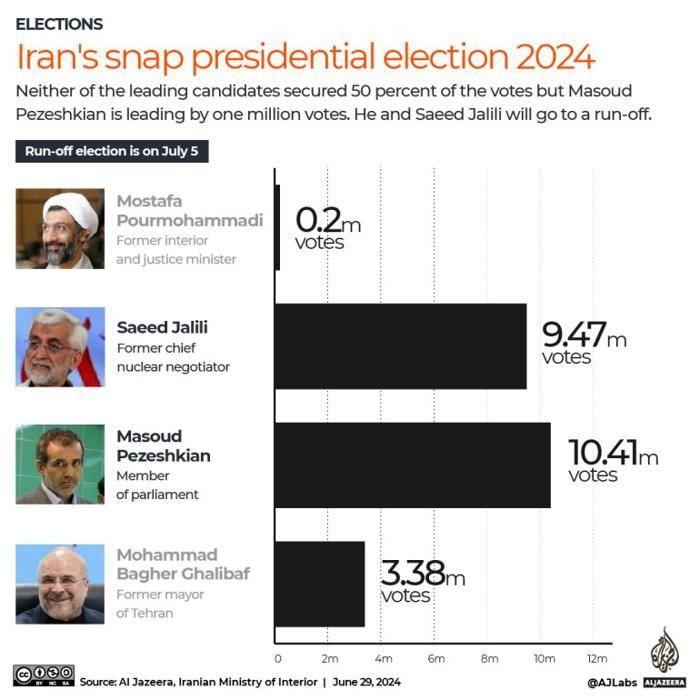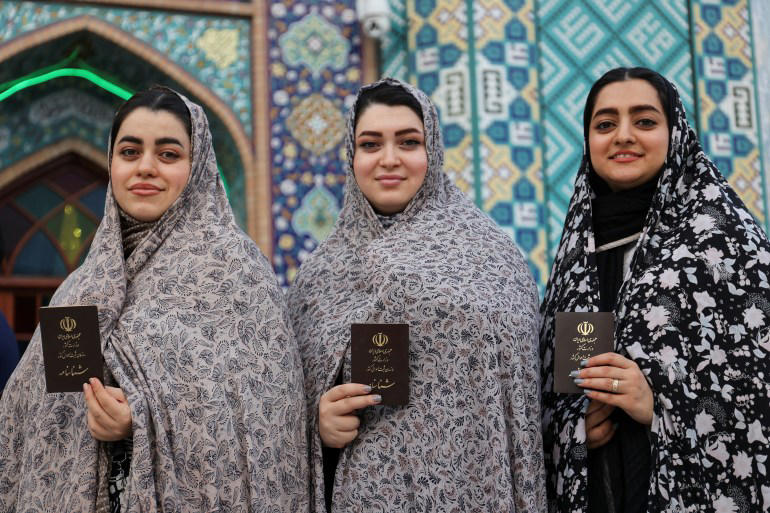Will Iran’s foreign policy change under a new president?
The two remaining candidates vying for the Iranian presidency, Saeed Jalili and Masoud Pezeshkian, offer voters distinct visions for the country’s future.
However, experts say their differing views are unlikely to lead to a significant change in Iran’s foreign policy.
Pezeskhian, a former health minister and surgeon, came first in Friday’s election but did not secure the 50 percent needed for an outright victory, forcing him into a run-off against second-placed Jalili to be held on July 5.
Friday’s snap election was to pick a successor to President Ebrahim Raisi, who died in a helicopter crash in late May.
Pezeshkian stands out in the race as the only non-conservative candidate allowed to run.
He had the backing of reformists like former Foreign Minister Mohammad Javad Zarif, whose involvement likely indicates Pezeshkian will pursue a key reformist foreign policy goal: renegotiating a nuclear deal to alleviate sanctions on Iran’s economy and ease tensions with the West.
The 2015 agreement between Iran and China, the European Union, France, Germany, Russia, the United Kingdom, United States, to curb its nuclear programme in exchange for sanctions relief, was signed under the centrist presidency of Hassan Rouhani.
But three years later, then-US President Donald Trump withdrew from the deal, crushing the hopes of those who believed it would have paved the way for Iran’s economic renaissance.
Instead, the US imposed harsh new sanctions, and Iranian hardliners found new ground to say the West could not be trusted. Talks over the deal’s revival have since largely stalled.
On the other side of the political spectrum, Jalili is considered the most rigid representative of conservative politics.
A victory for this staunch hardliner – with the backing of other conservative first-round candidates – would mark an even more confrontational approach towards the West, especially the US, analysts say.
Having served as the chief nuclear negotiator between 2007-2012, Jalili opposed the idea that Iran should discuss or compromise with other countries about its uranium enrichment programme – a stance he kept for the 2015 deal.
Not the only decision-maker
Regardless of the candidates’ markedly different stances, Iran’s president operates within a limited mandate.
Supreme Leader Ayatollah Ali Khamenei and the Islamic Revolutionary Guard Corps (IRGC) under him hold most of the say when it comes to foreign policy.

Iran
“If you get 180-degree change between a Trump or a [current US President Joe] Biden administration on the general trajectory of the US, in Iran, with a change of presidency, you get a 45 percent difference – it’s not insignificant but not as impactful as in other countries,” said Ali Vaez, chief of International Crisis Group’s Iran programme.
“There are elements of continuity that limit how much change one can see.”
This has been floated as one of the reasons behind the 40 per cent turnout in Friday’s election – the lowest in Iran’s history since the 1979 Islamic Revolution – as voters appear to have lost hope that much can improve with a change of president.
A reformist president would have to face the ultra-conservative forces dominating Iran’s parliament, while his ability to engage with the West would be tested by the country’s regional engagement, which has pitted it against allies of the West.
In April, Iran launched a missile and drone attack against Israel in retaliation for an Israeli assault on the Iranian consular building in Damascus, Syria, which killed senior IRGC commanders.
The unprecedented tit-for-tat came amid heightened regional tensions as Israel’s war on Gaza drags on and the potential of an all-out war between Israel and the Iran-backed Hezbollah in Lebanon looms larger.
But while regional policies have long been strictly handled by the IRGC, nuclear negotiations with world powers are still on the table.
On this matter, the president can set the tone and attitude, even if it is only for marginal changes, said Vali Nasr, a professor of Middle East studies at Johns Hopkins University.
“When it comes to the nuclear deal, the president can be very important in exploring possibilities for different kinds of outcomes,” Nasr said. “Pezeshkian would make a case to start talks with the US while Jalili would not.”
Nuclear diplomacy is central to Iranians as it directly affects the country’s economy – the top concern of most Iranians. Successive governments have failed to tackle currency depreciation and inflation, which they have blamed on the Western sanctions regime.
“For sanctions to be lifted, one needs to be interested in talking with the West – whether you have… an intransigent president, it does make a difference,” Nasr said.

Iranian women on the day of an election to choose a successor to Ebrahim Raisi following his death in a helicopter crash, in Tehran on June 28, 2024 [Majid Asgaripour/WANA via Reuters]
The hardline approach
A Jalili presidency would be in line with the late Raisi’s approach, who promised in his three-year tenure not to link the economy to nuclear talks with foreign powers.
Instead, the government decided to rely on Iran’s internal capabilities, while pivoting its business towards the East, strengthening ties with China, Russia and neighbouring countries.
Under the so-called “resistance economy”, Iran last year signed a China-brokered deal with Saudi Arabia ending a years-long cold war between the regional rivals.
Raisi also pushed for Iran to join the Shanghai Cooperation Organization and the country became a member of the BRICS bloc earlier this year.
But the so-called turn to the East did not produce tangible results in terms of improving the economy – something the conservative camp has acknowledged – leaving any future president in need of striking a balance when it comes to direction.
“Jalili won’t be able to completely avoid talks with the West, as Pezeshkian won’t focus just on nuclear talks,” said Hamid Reza Gholamzadeh, the director of DiploHouse, a think tank focused on foreign policy.
He added that Iran’s foreign policy will also depend on external factors – most importantly, the US election in November.
“The challenge is not from inside Iran but from outside – on whether Trump or Biden wins,” he said. “Even if Pezeskhian is the president, he will face foreign challenges, rather than domestic.”
